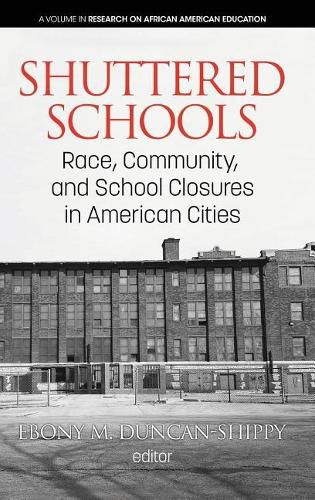Readings Newsletter
Become a Readings Member to make your shopping experience even easier.
Sign in or sign up for free!
You’re not far away from qualifying for FREE standard shipping within Australia
You’ve qualified for FREE standard shipping within Australia
The cart is loading…






This title is printed to order. This book may have been self-published. If so, we cannot guarantee the quality of the content. In the main most books will have gone through the editing process however some may not. We therefore suggest that you be aware of this before ordering this book. If in doubt check either the author or publisher’s details as we are unable to accept any returns unless they are faulty. Please contact us if you have any questions.
Since the late 1990s, mass school closures have reshaped urban education across the United States. Popular media coverage and research reports link this resurgence of school closures in major cities like Chicago and Philadelphia to charter school expansion, municipal budget deficits, and racial segregation. However, this phenomenon is largely overlooked in contemporary education scholarship. Shuttered Schools: Race, Community, and School Closures in American Cities (Information Age Publishing) is an interdisciplinary volume that integrates multiple perspectives to study the complex practice of school closure-an issue that transcends education. Academics, practitioners, activists, and policymakers will recognize the far-reaching implications of these decisions for school communities.
Shuttered Schools features rigorous new studies of school closures in cities across the United States. This research contextualizes contemporary school closures and accounts for their disproportionate impact on African American students. With topics ranging from gentrification and redevelopment to student experiences with school loss, research presented in this text incorporates various methods (e.g., case studies, interviews, regression techniques, and textual analysis) to evaluate the intended and unintended consequences of closure for students, families, and communities. This work demonstrates that shifts in the social, economic, and political contexts of education inform closure practice in meaningful ways. The impacts of shuttering schools are neither colorblind nor class-neutral, but indeed interact with social contexts in ways that reify existing social inequalities in education.
$9.00 standard shipping within Australia
FREE standard shipping within Australia for orders over $100.00
Express & International shipping calculated at checkout
This title is printed to order. This book may have been self-published. If so, we cannot guarantee the quality of the content. In the main most books will have gone through the editing process however some may not. We therefore suggest that you be aware of this before ordering this book. If in doubt check either the author or publisher’s details as we are unable to accept any returns unless they are faulty. Please contact us if you have any questions.
Since the late 1990s, mass school closures have reshaped urban education across the United States. Popular media coverage and research reports link this resurgence of school closures in major cities like Chicago and Philadelphia to charter school expansion, municipal budget deficits, and racial segregation. However, this phenomenon is largely overlooked in contemporary education scholarship. Shuttered Schools: Race, Community, and School Closures in American Cities (Information Age Publishing) is an interdisciplinary volume that integrates multiple perspectives to study the complex practice of school closure-an issue that transcends education. Academics, practitioners, activists, and policymakers will recognize the far-reaching implications of these decisions for school communities.
Shuttered Schools features rigorous new studies of school closures in cities across the United States. This research contextualizes contemporary school closures and accounts for their disproportionate impact on African American students. With topics ranging from gentrification and redevelopment to student experiences with school loss, research presented in this text incorporates various methods (e.g., case studies, interviews, regression techniques, and textual analysis) to evaluate the intended and unintended consequences of closure for students, families, and communities. This work demonstrates that shifts in the social, economic, and political contexts of education inform closure practice in meaningful ways. The impacts of shuttering schools are neither colorblind nor class-neutral, but indeed interact with social contexts in ways that reify existing social inequalities in education.